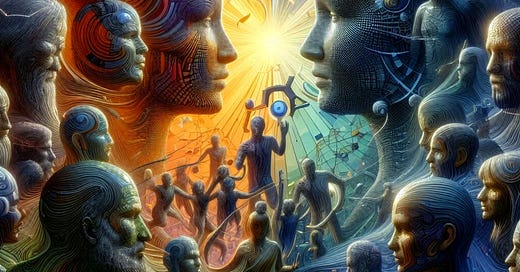Connected to All of Life
In a world often divided by race, ethnicity, and religion, the concept of experiencing oneself as a human being first and foremost offers a powerful paradigm shift. This idea, rooted in the recognition of our shared humanity, has the potential to transform society in profound and wonderful ways.
Overcoming Racial Burdens — The burden of racial identity, whether Black or White, weighs heavily on individuals in our society. This weight often prevents us from fully experiencing our shared humanity. By shifting our focus from racial categories to our common human experience, we open the door to a more unified and empathetic world. This shift doesn't negate the importance of cultural heritage but rather places it within the broader context of our shared human story.
Embracing Interconnectedness — To truly experience oneself as a human being requires a deep sense of connection - not just to immediate family or ethnic group, but to all of life. This expanded sense of kinship encompasses all people, all living things, and even the environment itself. Such a perspective fosters a profound respect for life in all its forms and could lead to more sustainable and compassionate treatment of our planet and its inhabitants.
The Role of Christianity — The passage challenges Christians, in particular, to embody the principle of brotherhood across racial lines. If Christians were to consistently practice this level of inclusivity and love, it could serve as a powerful catalyst for social change. Christian communities could become beacons of racial reconciliation, demonstrating to the broader society the possibility and benefits of transcending racial divisions.
Societal Transformation — The ripple effects of such a shift in perspective could be far-reaching. As more individuals begin to experience themselves and others as human beings first, it could lead to a reduction in prejudice and discrimination at all levels of society. This transformation would not be limited to personal interactions but could influence institutions, policies, and cultural norms.
Personal Growth and Healing — On an individual level, embracing this broader sense of human connection can lead to significant personal growth. It offers a path to greater empathy, a more expansive worldview, and potentially a more fulfilling life experience. Moreover, by focusing on shared humanity rather than racial differences, individuals might find relief from some of the psychological burdens associated with racial identity.
Moral Leadership — In a society often characterized by moral ambiguity, those who consistently practice this level of human connection could become pillars of integrity. They would serve as living examples of a more compassionate and unified way of being, potentially influencing positive change in various spheres of life.
Challenges and Opportunities — While this vision presents a beautiful ideal, it's important to acknowledge the challenges in implementing it. Centuries of racial division and ingrained biases cannot be overcome easily. However, the potential benefits - a more harmonious society, reduced racial tensions, improved mental health, and a more sustainable approach to our environment - make this a goal worth pursuing.
In conclusion, the idea of experiencing oneself primarily as a human being, connected to all of life, offers a powerful antidote to the divisions that plague our society. While the journey towards this ideal may be long and challenging, each step in this direction has the potential to create a more compassionate, unified, and vibrant world. As we move forward, let us strive to see the humanity in each other, transcending the artificial boundaries that too often keep us apart.




